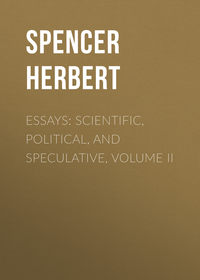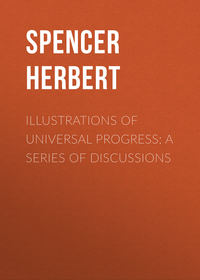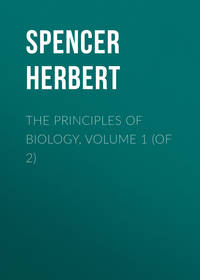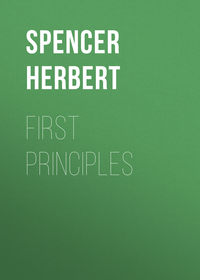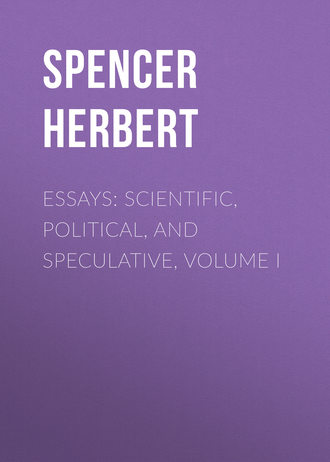
Essays: Scientific, Political, and Speculative, Volume I
Strangely enough, this passage, in which I am represented as implying novelty in a doctrine which I have merely sought to emphasize and extend, is immediately succeeded by a passage in which the Duke of Argyll himself represents the doctrine as being familiar and well established: —
"That organs thus enfeebled [i.e. by persistent disuse] are transmitted by inheritance to offspring in a like condition of functional and structural decline, is a correlated physiological doctrine not generally disputed. The converse case – of increased strength and development arising out of the habitual and healthy use of special organs, and of the transmission of these to offspring – is a case illustrated by many examples in the breeding of domestic animals. I do not know to what else we can attribute the long slender legs and bodies of greyhounds so manifestly adapted to speed of foot, or the delicate powers of smell in pointers and setters, or a dozen cases of modified structure effected by artificial selection."
In none of the assertions contained in this passage can I agree. Had the inheritance of "functional and structural decline" been "not generally disputed," half my argument would have been needless; and had the inheritance of "increased strength and development" caused by use been recognized, as "illustrated by many examples," the other half of my argument would have been needless. But both are disputed; and, if not positively denied, are held to be unproved. Greyhounds and pointers do not yield valid evidence, because their peculiarities are more due to artificial selection than to any other cause. It may, indeed, be doubted whether greyhounds use their legs more than other dogs. Dogs of all kinds are daily in the habit of running about and chasing one another at the top of their speed – other dogs more frequently than greyhounds, which are not much given to play. The occasions on which greyhounds exercise their legs in chasing hares, occupy but inconsiderable spaces in their lives, and can play but small parts in developing their legs. And then, how about their long heads and sharp noses? Are these developed by running? The structure of the greyhound is explicable as a result mainly of selection of variations occasionally arising from unknown causes; but it is inexplicable otherwise. Still more obviously invalid is the evidence said to be furnished by pointers and setters. How can these be said to exercise their organs of smell more than other dogs? Do not all dogs occupy themselves in sniffing about here and there all day long: tracing animals of their own kind and of other kinds? Instead of admitting that the olfactory sense is more exercised in pointers and setters than in other dogs, it might, contrariwise, be contended that it is exercised less; seeing that during the greater parts of their lives they are shut up in kennels where the varieties of odours, on which to practise their noses, is but small. Clearly if breeders of sporting dogs have from early days habitually bred from those puppies of each litter which had the keenest noses (and it is undeniable that the puppies of each litter are made different from one another, as are the children in each human family, by unknown combinations of causes), then the existence of such remarkable powers in pointers and setters may be accounted for; while it is otherwise unaccountable. These instances, and many others such, I should have gladly used in support of my argument, had they been available; but unfortunately they are not.
On the next page of the Duke of Argyll's article (page 145), occurs a passage which I must quote at length before I can deal effectually with its various statements. It runs as follows: —
"But if natural selection is a mere phrase, vague enough and wide enough to cover any number of the physical causes concerned in ordinary generation, then the whole of Mr. Spencer's laborious argument in favour of his 'other factor' becomes an argument worse than superfluous. It is wholly fallacious in assuming that this 'factor' and 'natural selection' are at all exclusive of, or even separate from, each other. The factor thus assumed to be new is simply one of the subordinate cases of heredity. But heredity is the central idea of natural selection. Therefore natural selection includes and covers all the causes which can possibly operate through inheritance. There is thus no difficulty whatever in referring it to the same one factor whose solitary dominion Mr. Spencer has plucked up courage to dispute. He will never succeed in shaking its dictatorship by such a small rebellion. His little contention is like some bit of Bumbledom setting up for Home Rule – some parochial vestry claiming independence of a universal empire. It pretends to set up for itself in some fragment of an idea. But here is not even a fragment to boast of or to stand up for. His new factor in organic evolution has neither independence nor novelty. Mr. Spencer is able to quote himself as having mentioned it in his Principles of Biology published some twenty years ago; and by a careful ransacking of Darwin he shows that the idea was familiar to and admitted by him at least in his last edition of the Origin of Species… Darwin was a man so much wiser than all his followers," &c.
Had there not been the Duke of Argyll's signature to the article, I could scarcely have believed that this passage was written by him. Remembering that on reading his article in the preceding number of this Review, I was struck by the extent of knowledge, clearness of discrimination, and power of exposition, displayed in it, I can scarcely understand how there has come from the same pen a passage in which none of these traits are exhibited. Even one wholly unacquainted with the subject may see in the last two sentences of the above extract, how strangely its propositions are strung together. While in the first of them I am represented as bringing forward a "new factor," I am in the second represented as saying that I mentioned it twenty years ago! In the same breath I am described as claiming it as new and asserting it as old! So, again, the uninstructed reader, on comparing the first words of the extract with the last, will be surprised on seeing in a scientific article statements so manifestly wanting in precision. If "natural selection is a mere phrase," how can Mr. Darwin, who thought it explained the origin of species, be regarded as wise? Surely it must be more than a mere phrase if it is the key to so many otherwise inexplicable facts. These examples of incongruous thoughts I give to prepare the way; and will now go on to examine the chief propositions which the quoted passage contains.
The Duke of Argyll says that "heredity is the central idea of natural selection." Now it would, I think, be concluded that those who possess the central idea of a thing have some consciousness of the thing. Yet men have possessed the idea of heredity for any number of generations and have been quite unconscious of natural selection. Clearly the statement is misleading. It might just as truly be said that the occurrence of structural variations in organisms is the central idea of natural selection. And it might just as truly be said that the action of external agencies in killing some individuals and fostering others is the central idea of natural selection. No such assertions are correct. The process has three factors – heredity, variation, and external action – any one of which being absent, the process ceases. The conception contains three corresponding ideas, and if any one be struck out, the conception cannot be framed. No one of them is the central idea, but they are co-essential ideas.
From the erroneous belief that "heredity is the central idea of natural selection" the Duke of Argyll draws the conclusion, consequently erroneous, that "natural selection includes and covers all the causes which can possibly operate through inheritance." Had he considered the cases which, in the Principles of Biology, I have cited to illustrate the inheritance of functionally-produced modifications, he would have seen that his inference is far from correct. I have instanced the decrease of the jaw among civilized men as a change of structure which cannot have been produced by the inheritance of spontaneous, or fortuitous, variations. That changes of structure arising from such variations may be maintained and increased in successive generations, it is needful that the individuals in whom they occur shall derive from them advantages in the struggle for existence – advantages, too, sufficiently great to aid their survival and multiplication in considerable degrees. But a decrease of jaw reducing its weight by even an ounce (which would be a large variation), cannot, by either smaller weight carried or smaller nutrition required, have appreciably advantaged any person in the battle of life. Even supposing such diminution of jaw to be beneficial (and in the resulting decay of teeth it entails great evils), the benefit can hardly have been such as to increase the relative multiplication of families in which it occurred generation after generation. Unless it has done this, however, decreased size of the jaw cannot have been produced by the natural selection of favourable variations. How can it then have been produced? Only by decreased function – by the habitual use of soft food, joined, probably, with disuse of the teeth as tools. And now mark that this cause operates on all members of a society which falls into civilized habits. Generation after generation this decreased function changes its component families simultaneously. Natural selection does not cover the case at all – has nothing to do with it. And the like happens in multitudinous other cases. Every species spreading into a new habitat, coming in contact with new food, exposed to a different temperature, to a drier or moister air, to a more irregular surface, to a new soil, &c., &c., has its members one and all subject to various changed actions, which influence its muscular, vascular, respiratory, digestive, and other systems of organs. If there is inheritance of functionally-produced modifications, then all its members will transmit the structural alterations wrought in them, and the species will change as a whole without the supplanting of some stocks by others. Doubtless in respect of certain changes natural selection will co-operate. If the species, being a predacious one, is brought, by migration, into the presence of prey of greater speed than before; then, while all its members will have their limbs strengthened by extra action, those in whom this muscular adaptation is greatest will have their multiplication furthered; and inheritance of the functionally-increased structures will be aided, in successive generations, by survival of the fittest. But it cannot be so with the multitudinous minor changes entailed by the modified life. The majority of these must be of such relative unimportance that one of them cannot give to the individual in which it becomes most marked, advantages which predominate over kindred advantages gained by other individuals from other changes more favourably wrought in them. In respect to these, the inherited effects of use and disuse must accumulate independently of natural selection.
To make clear the relations of these two factors to one another and to heredity, let us take a case in which the operations of all three may be severally identified and distinguished.
Here is one of those persons, occasionally met with, who has an additional finger on each hand, and who, we will suppose, is a blacksmith. He is neither aided nor much hindered by these additional fingers; but, by constant use, he has greatly developed the muscles of his right arm. To avoid a perturbing factor, we will assume that his wife, too, exercises her arms in an unusual degree: keeps a mangle, and has all the custom of the neighbourhood. Such being the circumstances, let us ask what are the established facts, and what are the beliefs and disbeliefs of biologists.
The first fact is that this six-fingered blacksmith will be likely to transmit his peculiarity to some of his children; and some of these, again, to theirs. It is proved that, even in the absence of a like peculiarity in the other parent, this strange variation of structure (which we must ascribe to some fortuitous combination of causes) is often inherited for more than one generation. Now the causes which produce this persistent six-fingeredness are unquestionably causes which "operate through inheritance." The Duke of Argyll says that "natural selection includes and covers all the causes which can possibly operate through inheritance." How does it cover the causes which operate here? Natural selection never comes into play at all. There is no fostering of this peculiarity, since it does not help in the struggle for existence; and there is no reason to suppose it is such a hindrance in the struggle that those who have it disappear in consequence. It simply gets cancelled in the course of generations by the adverse influences of other stocks.
While biologists admit, or rather assert, that the peculiarity in the blacksmith's arm which was born with him is transmissible, they deny, or rather do not admit, that the other peculiarities of his arm, induced by daily labour – its large muscles and strengthened bones – are transmissible. They say that there is no proof. The Duke of Argyll thinks that the inheritance of organs enfeebled by disuse is "not generally disputed;" and he thinks there is clear proof that the converse change – increase of size consequent on use – is also inherited. But biologists dispute both of these alleged kinds of inheritance. If proof is wanted, it will be found in the proceedings at the last meeting of the British Association, in a paper entitled "Are Acquired Characters Hereditary?" by Professor Ray Lankester, and in the discussion raised by that paper. Had this form of inheritance been, as the Duke of Argyll says, "not generally disputed," I should not have written the first of the two articles he criticizes.
But supposing it proved, as it may hereafter be, that such a functionally-produced change of structure as the blacksmith's arm shows us, is transmissible, the persistent inheritance is again of a kind with which natural selection has nothing to do. If the greatly strengthened arm enabled the blacksmith and his descendants, having like strengthened arms, to carry on the battle of life in a much more successful way than it was carried on by other men, survival of the fittest would ensure the maintenance and increase of this trait in successive generations. But the skill of the carpenter enables him to earn quite as much as his stronger neighbour. By the various arts he has been taught, the plumber gets as large a weekly wage. The small shopkeeper by his foresight in buying and prudence in selling, the village-schoolmaster by his knowledge, the farm-bailiff by his diligence and care, succeed in the struggle for existence equally well. The advantage of a strong arm does not predominate over the advantages which other men gain by their innate or acquired powers of other kinds; and therefore natural selection cannot operate so as to increase the trait. Before it can be increased, it is neutralized by the unions of those who have it with those who have other traits. To whatever extent, therefore, inheritance of this functionally-produced modification operates, it operates independently of natural selection.
One other point has to be noted – the relative importance of this factor. If additional developments of muscles and bones may be transmitted – if, as Mr. Darwin held, there are various other structural modifications caused by use and disuse which imply inheritance of this kind – if acquired characters are hereditary, as the Duke of Argyll believes; then the area over which this factor of organic evolution operates is enormous. Not every muscle only, but every nerve and nerve-centre, every blood-vessel, every viscus, and nearly every bone, may be increased or decreased by its influence. Excepting parts which have passive functions, such as dermal appendages and the bones which form the skull, the implication is that nearly every organ in the body may be modified in successive generations by the augmented or diminished activity required of it; and, save in the few cases where the change caused is one which conduces to survival in a pre-eminent degree, it will be thus modified independently of natural selection. Though this factor can operate but little in the vegetal world, and can play but a subordinate part in the lowest animal world; yet, seeing that all the active organs of all animals are subject to its influence, it has an immense sphere. The Duke of Argyll compares the claim made for this factor to "some bit of Bumbledom setting up for Home Rule – some parochial vestry claiming independence of a universal empire." But, far from this, the claim made for it is to an empire, less indeed than that of natural selection, and over a small part of which natural selection exercises concurrent power; but of which the independent part has an area that is immense.
It seems to me, then, that the Duke of Argyll is mistaken in four of the propositions contained in the passages I have quoted. The inheritance of acquired characters is disputed by biologists, though he thinks it is not. It is not true that "heredity is the central idea of natural selection." The statement that natural selection includes and covers all the causes which can possibly operate through inheritance, is quite erroneous. And if the inheritance of acquired characters is a factor at all, the dominion it rules over is not insignificant but vast.
Here I must break off, after dealing with a page and a half of the Duke of Argyll's article. A state of health which has prevented me from publishing anything since "The Factors of Organic Evolution," now nearly two years ago, prevents me from carrying the matter further. Could I have pursued the argument it would, I believe, have been practicable to show that various other positions taken up by the Duke of Argyll do not admit of effectual defence. But whether or not this is probable, the reader must be left to judge for himself. On one further point only will I say a word; and this chiefly because, if I pass it by, a mistaken impression of a serious kind may be diffused. The Duke of Argyll represents me as "giving up" the "famous phrase" "survival of the fittest," and wishing "to abandon it." He does this because I have pointed out that its words have connotations against which we must be on our guard, if we would avoid certain distortions of thought. With equal propriety he might say that an astronomer abandons the statement that the planets move in elliptic orbits, because he warns his readers that in the heavens there exist no such things as orbits, but that the planets sweep on through a pathless void, in directions perpetually changed by gravitation.
I regret that I should have had thus to dissent so entirely from various of the statements made, and conclusions drawn, by the Duke of Argyll, because, as I have already implied, I think he has done good service by raising afresh the question he has dealt with. Though the advantages which he hopes may result from the discussion are widely unlike the advantages which I hope may result from it, yet we agree in the belief that advantages may be looked for.
END OF VOL. I1
Carpenter, Principles of Comparative Physiology, p. 474.
2
Since this was written (in 1857) the advance of paleontological discovery, especially in America, has shown conclusively, in respect of certain groups of vertebrates, that higher types have arisen by modifications of lower; so that, in common with others, Prof. Huxley, to whom the above allusion is made, now admits, or rather asserts, biological progression, and, by implication, that there have arisen more heterogeneous organic forms and a more heterogeneous assemblage of organic forms.
3
For detailed proof of these assertions see essay on "Manners and Fashion."
4
The argument concerning organic evolution contained in this paragraph and the one preceding it, stands verbatim as it did when first published in the Westminster Review for April, 1857. I have thus left it without the alteration of a word that it may show the view I then held concerning the origin of species. The sole cause recognized is that of direct adaptation of constitution to conditions consequent on inheritance of the modifications of structure resulting from use and disuse. There is no recognition of that further cause disclosed in Mr. Darwin's work, published two and a half years later – the indirect adaptation resulting from the natural selection of favourable variations. The multiplication of effects is, however, equally illustrated in whatever way the adaptation to changing conditions is effected, or if it is effected in both ways, as I hold. I may add that there is indicated the view that the succession of organic forms is not serial but proceeds by perpetual divergence and re-divergence – that there has been a continual "divergence of many races from one race": each species being a "root" from which several other species branch out; and the growth of a tree being thus the implied symbol.
5
"Personal Narrative of the Origin of the Caoutchouc, or India-Rubber Manufacture in England." By Thomas Hancock.
6
Carpenter's Principles of Comparative Physiology, pp. 616-17.
7
With the exception, perhaps, of the Myxinoid fishes, in which what is considered as the nasal orifice is single, and on the median line. But seeing how unusual is the position of this orifice, it seems questionable whether it is the true homologue of the nostrils.
8
In the Westminster Review for April, 1857; and now reprinted in this volume.
9
See Essay on "Progress: its Law and Cause."
10
This was written before the publication of the Origin of Species. I leave it standing because it shows the stage of thought then arrived at.
11
Cosmos. (Seventh Edition.) Vol. i. pp. 79, 80.
12
Since the publication of this essay the late Mr. R. A. Proctor has given various further reasons for the conclusion that the nebulæ belong to our own sidereal system. The opposite conclusion, contested throughout the foregoing section, has now been tacitly abandoned.
13
Any objection made to the extreme tenuity this involves, is met by the calculation of Newton, who proved that were a spherical inch of air removed four thousand miles from the Earth, it would expand into a sphere more than filling the orbit of Saturn.
14
A reference may fitly be made here to a reason given by Mons. Babinet for rejection of the Nebular Hypothesis. He has calculated that taking the existing Sun, with its observed angular velocity, its substance, if expanded so as to fill the orbit of Neptune, would have nothing approaching the angular velocity which the time of revolution of that planet implies. The assumption he makes is inadmissible. He supposes that all parts of the nebulous spheroid when it filled Neptune's orbit, had the same angular velocities. But the process of nebular condensation as indicated above, implies that the remoter flocculi of nebulous matter, later in reaching the central mass, and forming its peripheral portions, will acquire, during their longer journeys towards it, greater velocities. An inspection of one of the spiral nebulæ, as 51st or 99th Messier, at once shows that the outlying portions when they reach the nucleus, will form an equatorial belt moving round the common centre more rapidly than the rest. Thus the central parts will have small angular velocities, while there will be increasing angular velocities of parts increasingly remote from the centre. And while the density of the spheroid continues small, fluid friction will scarcely at all change these differences.
A like criticism may, I think, be passed on an opinion expressed by Prof. Newcomb. He says: – "When the contraction [of the nebulous spheroid] had gone so far that the centrifugal and attracting forces nearly balanced each other at the outer equatorial limit of the mass, the result would have been that contraction in the direction of the equator would cease entirely, and be confined to the polar regions, each particle dropping, not towards the sun, but towards the plane of the solar equator. Thus, we should have a constant flattening of the spheroidal atmosphere until it was reduced to a thin flat disk. This disk might then separate itself into rings, which would form planets in much the same way that Laplace supposed. But there would probably be no marked difference in the age of the planets." (Popular Astronomy, p. 512.) Now this conclusion assumes, like that of M. Babinet, that all parts of the nebulous spheroid had equal angular velocities. If, as above contended, it is inferable from the process by which a nebulous spheroid was formed, that its outer portions revolved with greater angular velocities than its inner; then the inference which Prof. Newcomb draws is not necessitated.


